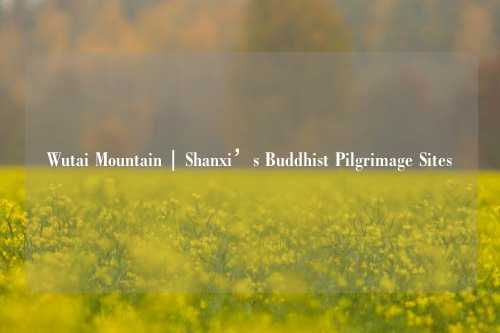Wutai Mountain | Shanxi’s Buddhist Pilgrimage Sites
part 1
Nestled in the heart of Shanxi province, Wutai Mountain stands as a towering symbol of faith and spiritual awakening. Renowned as one of China's most sacred Buddhist pilgrimage sites, Wutai Mountain (known as "Wutaishan" in Chinese) is a place where history, culture, and nature converge in a symphony of awe-inspiring beauty and spirituality. This UNESCO World Heritage Site is not just a destination for the devout; it is a journey that speaks to the soul, inviting travelers to explore its winding pathways, ancient temples, and the timeless wisdom they hold.
The Legend of Wutai Mountain

Wutai Mountain is a place steeped in legend and lore. Its name translates to "Five Terrace Mountain," a nod to the five flat peaks that rise majestically above the surrounding landscape. According to Buddhist tradition, these peaks are said to represent the five holy mountains of the Western Paradise, a sacred realm where the Buddha and his bodhisattvas reign. Pilgrims have journeyed to Wutai Mountain for centuries, drawn by its purported connection to the bodhisattva of compassion, Avalokitesvara (Guanyin in Chinese), who is believed to have chosen Wutai as one of her 32 forms.
A Historical and Cultural Treasure Trove
Wutai Mountain is not merely a natural wonder; it is a living museum of Chinese Buddhist art and architecture. Its monasteries, which date back over 1,400 years, are a testament to the enduring influence of Buddhism in China. The mountain is home to over 50 temples, each with its own charm and historical significance. Among these, the most famous are the Foguang Temple, the most ancient surviving wooden structure in China; the Xiantong Temple, one of the oldest Buddhist temples in the country; and the Tayuan Temple, known for its beautiful garden and serene atmosphere.
For the traveler, Wutai Mountain offers a chance to step back in time, to walk among the same stone paths that have been trodden by pilgrims for generations. The sense of history is palpable, as you gaze upon the carvings, vibrant frescoes, and towering pagodas that dot the landscape. Each temple tells a story, inviting you to pause, reflect, and soak in the serenity of this sacred land.
A Place of Spiritual Renewal
While Wutai Mountain is certainly a destination for history buffs and architecture enthusiasts, it is perhaps most for those seeking spiritual renewal. The mountain's tranquil environment, with its crisp mountain air, lush forests, and rushing streams, creates the perfect backdrop for introspection and meditation. Pilgrims are drawn here to pay their respects, offer prayers, and seek blessings, but they often leave with something far more – a renewed sense of peace and purpose.
The practices of Buddhism are deeply rooted in Wutai Mountain's culture. Monks and lay practitioners alike can be seen performing rituals, chanting sutras, and offering incense in the temples. For those who are new to the faith, Wutai Mountain offers a opportunity to observe and participate in these practices, to gain a deeper understanding of Buddhist teachings, and to find inner calm in a world that often feels overwhelming.
An Unforgettable Natural Setting
Wutai Mountain's natural beauty is as captivating as its and spiritual offerings. Perched at an altitude of over 2,000 meters, the mountain is surrounded by a misty landscape that seems to change with the seasons. Spring brings carpets of wildflowers, summer offers lush greenery and cool temperatures, autumn is painted in hues of gold and crimson, and winter transforms the landscape into a serene, snow-covered wonderland.
The mountain's rugged terrain and winding trails are a haven for hikers and nature lovers. While the paths are steep and demanding, the effort to reach the summit is rewarded with breathtaking views that take your breath away. At the top, you can stand in awe of the vast, open spaces and feel a sense of connection to the natural world. For those seeking a more active adventure, Wutai Mountain is also a popular destination for rock climbing and mountaineering.
A Unique blend of Ancient and Modern
While Wutai Mountain is a place of deep tradition, it is not immune to the influences of the modern world. The mountain has become an increasingly popular destination for international travelers, and its temples are often filled with people from all walks of life. Yet, despite the influx of visitors, the essence of Wutai Mountain remains unchanged. The sense of calm, the air of reverence, and the deep connection to something greater than oneself are still very much present.
For the traveler seeking a blend of ancient culture, spiritual renewal, and natural beauty, Wutai Mountain is an undeniable must-visit. It is a place where the past and present coexist in perfect harmony, where the boundaries between the physical and the spiritual dissolve, and where the only thing that matters is the journey inward.
part 2
A Journey of Mind, Body, and Spirit
Visiting Wutai Mountain is not merely a physical journey; it is an experience that engages the mind, body, and spirit. As you ascend the mountain, each step brings you closer not only to the peak but also to a deeper understanding of yourself and the world around you. The path to enlightenment, as taught by Buddhism, is a lifelong journey, and Wutai Mountain provides the perfect setting to take that journey, even if just for a brief moment.
The Pilgrimage Experience
For many, a visit to Wutai Mountain is more than just a vacation; it is a pilgrimage. Pilgrims come with specific intentions, whether it be to seek blessings for health, wealth, or peace, or to pay homage to the bodhisattva they revere. The pilgrimage experience is deeply personal, but it is also a shared one. Along the way, you will meet fellow travelers who are on their own quests for spiritual fulfillment. These encounters often lead to meaningful connections, as people from diverse backgrounds come together in the shared pursuit of inner peace.
The act of pilgrimage itself is a form of meditation. As you walk the winding paths, carrying incense, candles, or flowers to offer at the temples, you are reminded of the simplicity and purity of your intentions. Each step becomes a chance to let go of distractions, to focus on the present moment, and to connect with your inner self.
Mindful Practices for Spiritual Growth
Wutai Mountain offers countless opportunities for mindful practices that can enhance your spiritual journey. spend a moment in silent meditation at one of the mountain's many meditation halls, or participate in a chanting session led by the monks. These practices, while simple, can have a impact on your ability to find peace and clarity in your life.
The teachings of Buddhism are also a source of wisdom and inspiration. Take the time to learn about the core principles of the faith, such as the Four Noble Truths, the Eightfold Path, and the concept of interdependent origination. These teachings emphasize the importance of mindfulness, compassion, and letting go of attachment, offering practical guidance for living a more fulfilling life.
Cultivating Compassion
Compassion is at the heart of Buddhist teachings, and Wutai Mountain is a place where this value is deeply ingrained. The monks and nuns who inhabit the temples are a living example of how to embody compassion in daily life. Their acts of kindness, whether it be offering tea to visitors or performing rituals for the departed, reflect the core values of the faith.
For travelers, cultivating compassion is an important part of the experience. As you interact with the local community, the temple staff, and fellow pilgrims, make an effort to approach every encounter with kindness and understanding. Remember, every interaction is an opportunity to practice the principles of Buddhism and to spread positivity in the world.
Finding Inner Peace
In a world that often feels chaotic and overwhelming, Wutai Mountain offers a sanctuary of peace and tranquility. The mountain's serene environment and the quiet practices of its inhabitants make it a place where you can truly slow down and reflect. Whether you are an experienced practitioner or someone new to the faith, the time you spend here can be transformative.
The journey to inner peace is not always easy, but it is always worthwhile. By taking the time to pause, reflect, and reconnect with your true self, you can find strength and clarity in the face of life's challenges. Wutai Mountain provides the perfect environment to take those first steps on your path to enlightenment.
The Call of the Open Sky
As you stand at the summit of Wutai Mountain, looking out over the vast expanse of land that stretches before you, you are reminded of the beauty and vastness of life. The mountain's rugged peaks and rolling hills are a metaphor for the journey of life, with its own challenges and rewards. Just as you must climb the steep paths to reach the top, so too must you navigate the ups and downs of life with resilience and determination.
The open sky above Wutai Mountain is a reminder of the boundlessness of the human spirit. It is a symbol of freedom, ial, and the infinite possibilities that lie ahead. As you gaze up at the sky, you are filled with a sense of awe and gratitude, reminded of the wonder and beauty that exists in the world.
A Final Thought
Wutai Mountain is more than just a destination; it is a destination that touches the soul. It is a place where the boundaries between the physical and the spiritual dissolve, where the past and present coexist in perfect harmony. For those who visit, whether as a pilgrim or a traveler, Wutai Mountain leaves an indelible mark on the heart.
The mountain's history, culture, and natural beauty are a testament to the enduring power of faith and the importance of connecting with the inner self. As you leave Wutai Mountain, you are not just taking away memories; you are carrying with you a piece of its serenity, a reminder of the peace that can be found within. So, if you ever feel lost or overwhelmed, remember the lessons of Wutai Mountain: slow down, reflect, and find strength in the journey.
This concludes the soft article on Wutai Mountain.
















